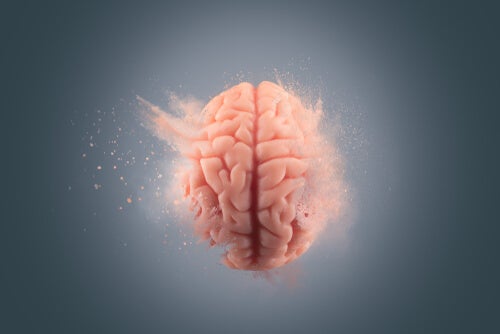Forgetting is More Complicated than Remembering


Written and verified by the psychologist Valeria Sabater
Who hasn’t tried to erase an unpleasant memory or a traumatic experience! However, to your brain, forgetting is more complicated than remembering. It’s as if this fascinating organ wants you to remember because your memories are the essence of your experience.
While it’s true that this reality may seem hopeless, note that everything has an end in the universe of neuroscience. Memory represents who you are. If you could erase any chapter of our life at will, then you would cease to be who you are. Because, after all, each person is made of light and shadows, successes, and also mistakes and tragedies.
However, this doesn’t mean that scientists and the rest of the world don’t wonder why. Why can’t the brain erase a specific fact at will? Moreover, why do people forget some things and others linger like the light of a lighthouse flashing once and again at the same banks of painful memories?
Researchers published a study recently that revealed the answers to these questions.
“It’s all fine to say, “Time will heal everything, this too shall pass away. People will forget”—and things like that when you’re not involved, but when you are there’s no passage of time, people don’t forget and you’re in the middle of something that doesn’t change.”
-John Steinbeck-

Why is forgetting more complicated for the brain than remembering?
The University of Texas at Austin conducted an investigation to find out why forgetting is more complicated for the human brain than remembering. While it’s true that everyone knows it happens frequently, you need to understand what neuronal mechanisms orchestrate this psychological reality.
Jarrod Lewis-Peacock, the lead author of the study and professor of psychology at this university, pointed out something important. The brain constantly sheds data and experiences and it almost always does it while you’re asleep. People do so unconsciously and have no control over it. The reason is the human brain discards unimportant and transcendental facts. This is because its main goal is to improve efficiency.
Likewise, something observed through magnetic resonance is that when a person strives to forget something specific, the effort concentrates on three brain regions. For instance, you made an attempt to get the attention of someone you like and it led to an unfortunate situation. The experience took place in all three: the prefrontal cortex, the ventral temporal cortex, and the hippocampus.
Forgetting is more complicated than remembering due to the associations and emotional burden
There are neutral memories and highly emotional memories. As neuroscientists explain, the material most people forget almost instantly is the visual one. Throughout the day, humans forget about 80% of the things they see: the license plates of cars, the faces of the people you meet, the colors of the clothes others wear, etc.
However, if there is something that presents great resistance to oblivion are all those facts where an imprint of emotion remains. If something made you afraid, ashamed, or happy, it’ll stay longer in your memory because your brain considers it significant.
On the other hand, there’s a remarkable fact. Many of our memories are rich because they’re formed through associations. When you experience something meaningful, your brain puts together images, smells, sounds, and your own impressions in relation to past events. All of it consolidates certain memories even further.

Your memories, both pleasant and unpleasant, define who you are now
Each experience, sensation, thought, habit, and emotion lead to a change at the brain level. Thus, it generates a connection, and the brain either rearranges it or modifies it. Forgetting is more complicated than remembering because deleting a fragment of your past means you must also delete that connection, a cerebral synapse.
Somehow, each experience, both pleasant and unpleasant, prepares the brain for future experiences. And all those synapses and brain modifications created from each felt and lived fact build that cerebral anatomy that defines you. Every memory, every sensation builds, so to speak, the mountains of your vital geological ages.
Forgetting is possible but only under certain circumstances
In the study cited above, the focus is put on a funny detail. Intentional forgetting is possible in certain cases.
According to that research, a person may forget an experience if they “generate” a level of moderate brain activity. What does this mean?
- It means that if you don’t give excessive importance to a fact (such as making a mistake in front of people) it’s easier to forget it.
- Also, if you avoid reducing the emotional impact on that fact and don’t think about it for so long, it’s easier for that experience to leave your memory.
- A moderate level of brain activity is the key to forgetting.
Similarly, if there’s an intense emotional component and you focus your thoughts persistently on the concrete fact you wish to forget, it’s 100% likely that you won’t.
It seems ironic, but the brain mechanism complies with this rule. Therefore, with this in mind, you can only assume a very simple fact: that forgetting doesn’t solve anything.
You are, after all, your successes and your mistakes. Thus, every loss, mistake, or disaffection is part of your journey as a human being.
All cited sources were thoroughly reviewed by our team to ensure their quality, reliability, currency, and validity. The bibliography of this article was considered reliable and of academic or scientific accuracy.
- Tracy H. Wang, Katerina Placek, Jarrod A. Lewis-Peacock. More is less: increased processing of unwanted memories facilitates forgetting. The Journal of Neuroscience, 2019; 2033-18 DOI: 10.1523/JNEUROSCI.2033-18.2019
This text is provided for informational purposes only and does not replace consultation with a professional. If in doubt, consult your specialist.








